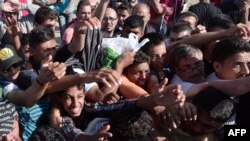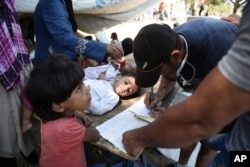The U.N. children’s fund reports authorities in the former Yugoslav Republic of Macedonia are being overwhelmed by the heavy influx of refugees, mainly from Syria, transiting to European countries for asylum.
UNICEF describes chaotic scenes on the Macedonian side of the border with Greece as authorities vainly try to control huge crowds of refugees wanting to enter the country. Speaking on the phone from the capital, Skopia, UNICEF representative Bertrand Desmoulins says there has been a dramatic increase in the number of people arriving in recent days.
He says arrivals, which had been averaging around 3,500 a day, jumped to more than 5,600 Thursday. He says authorities have been letting 25 people cross the border from Greece into Macedonia every 15 minutes to avoid big crowds from gathering.
He says this system is making matters worse for the refugees.
“And those people have been waiting without any support on the other side of the border," he said. "They are totally exhausted. They are hungry. They are thirsty. They have a problem of hygiene. And, we can provide the services inside the reception center, but not outside. And, they tend to let the people come in and then to push them directly into the train, which comes all the way to the reception center or into the buses.”
After the people are registered, he says they move on quickly to Serbia, which is a gateway to the European Union.
Desmoulins tells VOA most of the refugees are fleeing war in Syria. But, he notes the makeup of those arriving in Macedonia has changed.
“It is very interesting. A few months ago, it was only men, young men crossing. And, it seems now that the young women and the mothers and the children are following later," he said. "Before we had mainly men and it seems that those men made it and now they are opening the doors and asking for their families to join them. And, that is what we are seeing now at the moment.”
Desmoulins says UNICEF is limited in the help it can give to the refugees. He says aid workers are not able to care for their many physical and emotional needs because they do not have access to all the people coming through. He says he hopes this situation will change as the authorities learn to better manage the flow of people coming across the border.





